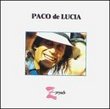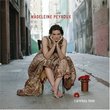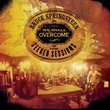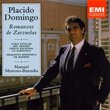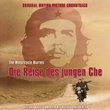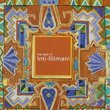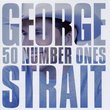| All Artists: Richard [Classical] Wagner, Georg Solti, Vienna Philharmonic Orchestra, Claire Watson, Eberhard Wächter, George London, Gustav Neidlinger, Hetty Plumacher, Ira Malaniuk, Jean Madeira, Kirsten Flagstad, Kurt Böhme, Oda Balsborg, Paul Kuen, Set Svanholm, Waldemar Kmentt, Walter Kreppel Title: Wagner: Das Rheingold Members Wishing: 0 Total Copies: 0 Label: Decca / London Release Date: 10/14/1997 Album Type: Original recording reissued, Import Genre: Classical Style: Opera & Classical Vocal Number of Discs: 2 SwapaCD Credits: 2 UPC: 028945555621 |
Search - Richard [Classical] Wagner, Georg Solti, Vienna Philharmonic Orchestra :: Wagner: Das Rheingold
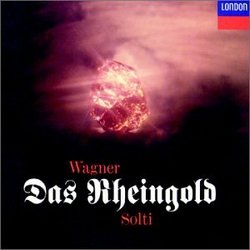 | Richard [Classical] Wagner, Georg Solti, Vienna Philharmonic Orchestra Wagner: Das Rheingold Genre: Classical
|
Larger Image |
CD DetailsSimilarly Requested CDs
|
CD ReviewsThe finest stereo "Rheingold" cdsullivan@massed.net | Cambridge, MA USA | 04/10/2002 (4 out of 5 stars) "Despite the frequency with which the Ring Cycle has been recorded over the last fifty years, there is yet to be a definitive recording of it. This is perhaps not surprising, considering that the cycle is around fifteen hours long, and is full of intensely demanding music. Although Solti's Ring has been long considered the ideal recording, I do not agree. I believe it is the best stereo set in the catalogue, but because it is the "least bad" of a flawed group.The main issue is Solti's conducting. His conducting is very extrovert and dramatic, sometimes whipping the climaxes up to peaks of astounding intensity. However, he tends to neglect the long line of the piece in favor of momentary brilliance, and he doesn't seem to have a clear sense of transition and relationship between tempi, which are absolutely essential for good Wagner conducting. He often ignores specific directions in Wagner's detailed score in order to make the piece sound as thrilling as possible. For example, the opening prelude is taken at a swift tempo, which could work very well with a delicate touch, but Solti's phrasing of the rapid string figuration is rough and stormy, conjuring up images of a hurricane, not a flowing river. Solti exaggerates the opening of Scene 2, with the quiet statement of the Valhalla motif: he seizes greedily upon every crescendo, mezzo-forte and piu forte direction, with the result that the serenity of the music is somewhat lost. The most obvious drawbacks come in the final scene, though. At Donner's "Heda, heda, hedo!", Solti engulfs the baritone with an enormous, swirling sea of radiant string sound - it's absolutely thrilling, but the passage is marked pianissimo! Also, Solti introduces a much faster tempo at Loge's "Ihrem Ende eilen sie zu" than he had used immediately before in Wotan's "Abendlich strahlt" - despite the fact that there is no change of tempo marked. These are only a few of the many instances throughout the opera where Solti sacrifices Wagner's intentions and the structure of the piece for momentary effect.However, Solti's conducting unquestionably has its good side. His handling of the climaxes is almost peerless, but he also provides many moments of ideal interpretation throughout the opera. Perhaps surprisingly, one of them is his moving conducting of the lyrical passages in Scene 2, such as Fasolt's "Ein Weib zu gewinnen" and Loge's aria. I would also like to single out his handling of the entirety of Scene 3 for its vividness, crispness and electricity. The final fifteen minutes of the entire work, despite the drawbacks I mentioned earlier, are also superb. The magic of Wagner's orchestration in the Rainbow and Valhalla music has rarely been brought out so radiantly. In sum, Solti is always brilliant and intense, but sometimes insensitive and incorrect.The factor that tips the balance in favor of this "Rheingold" is the cast. Some of the greatest names in Wagnerian interpretation are heard here in their prime - something no other stereo set can boast. The cast is headed by the Alberich of Gustav Neidlinger. Not only is this performance more beautifully, resonantly and darkly sung than any other I have heard, Neidlinger's delivery of the text is astonishingly vivid. It would take much more space than I have here to deal with his interpretation in the depth it deserves, so a few examples will have to suffice: everything in the encounter with Wotan and Loge in Scene 3 is fabulous, but especially his handling of "Die in linder Lüfte Wehn da oben ihr lebt" (note especially how he snarls the word "Schwelger"). His rage when Wotan is trying to get the Ring off him is almost frightening, and his curse is unsurpassed in its venomous intensity. Another revelation is the Fricka of the great Kirsten Flagstad. Although she was 63 at the time of the recording, her glorious, golden voice is in miraculous condition. Wotan is sung by George London, who has a dark, regal bass-baritone and a commanding presence. His legato line, however, could be smoother, and his singing is sometimes rough, though he's never less than admirable. Loge is taken by Svanholm, formerly a Siegfried, which means his is one of the best-sung performances of this role; however, I feel he could have characterized more. My favorite in this role is the shining Jerusalem (Levine). The giants are excellent, particularly Böhme as Fafner; I prefer Moll's Fasolt to Kreppel's. Erda (heavy vibrato) and the Rhinemaidens (shrill and old-sounding) are less successful. The other roles are well taken.The sound effects have become a famous (and for some, infamous) aspect of this Ring. I think Culshaw had the right idea, because the effects are necessary to the story, and Wagner asked for them. The only one I don't like is Alberich's thunderous laugh at the end of Scene 1 (it totally obliterates an essential, violent chord in the bass); otherwise, everything from the screams of the Nibelungs to the clang of the anvils comes off astonishingly well. Donner's hammer blow and the thunderclap in the final scene have never been matched.Overall, the dramatic intensity of Solti and the magnificent singing make this the finest stereo "Rheingold." Böhm's Bayreuth account, despite a more mature, inspired view of the score than Solti's, is ruined by bad orchestral playing and some routine singing; Karajan is probably more beautiful than anyone else, but there is no tension and the performance is generally lifeless; Levine's beautiful performance, the best of modern versions, is more dramatic and towering than Karajan's, but still seems relatively studio-bound, and the orchestral balance obliterates the wind parts. Therefore, if you're unsatisfied by Solti, you'll need to go back a few years (and several degrees in sound quality) to 1953, either for Krauss's thrilling Bayreuth performance, or for Furtwängler's overwhelming RAI reading. The Solti is still the basic recommendation for this underrated masterpiece. Happy listening!" A MAGNIFICENT RHEINGOLD Timothy Kearney | Hull, MA United States | 11/20/2004 (5 out of 5 stars) "DAS RHEINGOLD, the prelude to Wagner's drama DER RING DES NIBELUNGEN, is the shortest work in the series, and at times it can be forgotten. Of the four pieces that make up the Ring Cycle, it probably would not be a stand alone opera, as the other three would be, and with the exception of "The Entry of the gods into Valhalla" it does not have the memorable highlights of the other three longer works of the cycle. Yet as listeners discover this opera, the richness of this gem becomes apparent. The story is told through the music, and even without knowing the plot, one can sense from the music the blissful state of the Rhine maidens and how the peace is destroyed through greed which will culminate in the final scenes of GOTTERDAMMERUNG. The opera itself contains many of the leitmotifs that will continue throughout the remaining three pieces. Many critics as well as other Amazon reviewers believe that this may be the best recording of DAS RHEINGOLD, or at least the greatest stereo recording of the work. Two reasons are given as a basis: the solid performance of the singers and the mastery of Sir Georg Solti. Solti made this recording in the late 1950's which was perhaps one of the greatest moments in history to assemble a cast to record any Wagner opera, and Solti selected the best in a cast that includes George London and Kirsten Flagstad. This recording is magnificent, and the cast works together as an ensemble, which is essential in Wagner. While some opera recordings can still be adequate with uneven performers, for Wagner it can be devastating. All one needs to do is look at many of the reviews of the Solti WALKURE, which has some captivating moments, but also weak moments that for some (though not all, I love that recording too) ruins the entire work. For some the orchestra is a bit too heavy, a criticism leveled against Solti on many occasions, but overall the orchestra and singers compliment each other well. The only flaw is a few of the non orchestral sound effects that can be a bit jarring at times (some bells and female screams) but at the time the recording was made, they were rather innovative. After listening to the recording a few times, the sound effects are barely noticeable. People who are looking at this review who are familiar with the RING cycle and are considering purchasing this set, as well as the other operas should ask themselves the question "Do I generally like the conducting of Solti?" If the answer is yes, then purchase this set. Solti's handling of the score is quintessential Solti, which is why I love it. The Solti set is my favorite RING cycle, Levine and the Met is a close second. This may be due to the riveting televised performances of the four operas when the Met staged a new production of the complete RING in the late 1980's/early 1990's when Levine recorded the works. As anyone who reads the various reviews of Wagner's operas can see, Wagner lovers have specific tastes regarding Wagner, and at times people can vehemently disagree. For me, powerful voices with great dramatic range and a majestic orchestra that is not bombastic is ideal for Wagner, and this is what Solti's recordings provide. While this is strength for the RING, it is a disservice for some Wagner, as people who have heard the Solti Meistersinger know all too well. For people who are considering purchasing this recording who are unfamiliar with the RING, I am not sure that DAS RHEINGOLD is the best first purchase. I love the RING, but fell in love with it in this order: GOTTERDAMMERUNG, WALKURE, DAS RHEINGOLD, and SEIGFRIED. For me, the last of the four operas, GOTTERDAMMERUNG is the most dramatically compelling, has moments of sheer beauty and power. It has familiar music, brief but majestic orchestral and choral pieces, duets that carry a listener away, and a desire to know hat comes ahead of this great work. WALKURE has similar moments to those of GOTTERDAMMERUNG. After becoming familiar with these two works, the beauty of DAS RHEINGOLD is enticing. SIEGFRIED is the last of the four operas I became familiar with, and I believe that I appreciated its intensity and intricacy after becoming familiar with the other three works. Enjoy!!! " This recording has its charms NotATameLion | Michigan | 03/09/2001 (4 out of 5 stars) "To be upfront with my opinion--despite its flaws, Solti's "Ring" is my favorite version of Richard Wagner's MASSIVE opera. Das Rheingold is probably the least accessible part of the Ring...no real human action for us mortals to relate to. Yet, this recording certainly has its charms:I cannot imagine a better Fricka than Kirsten Flagstad. Her performance here is worth more than the price of admission. Furthermore, George London is an impressive and always reliable Wotan. Their coupling is inspirational.However, as far as the singing goes...the real show here is Gustav Neidlinger. His Alberich is a perfect example of the fallenness of humanity...expressive of so much emotion...yet always ready for some kind of treachery.Solti and the Vienna Philharmonic are outstanding. From the opening "Vorspiel" (one of my favorite pieces of music) to the closing "Rheingold! Rheingold! Reines Gold!" What more could one want? The sound of the anvils on disc one is not to be missed.While Karajan's (and to a lesser extent--Levine's) Ring recordings have their upsides...I give this one the slight edge due to its consistency and heartfelt emotion; not to mention its beautiful sound.So find it and listen to it...its well worth the time spent."
|

 Track Listings (15) - Disc #1
Track Listings (15) - Disc #1
